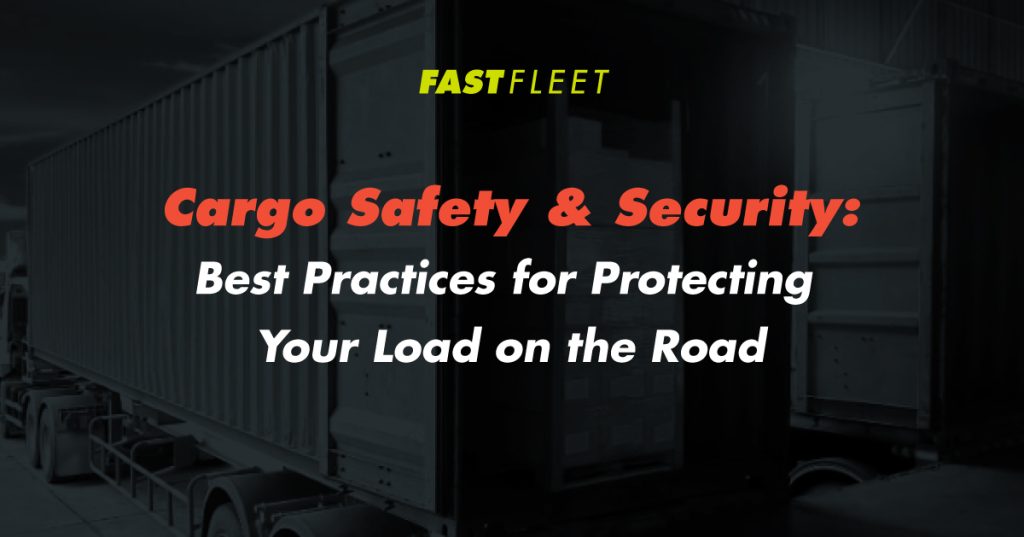Cargo Safety and Security: Best Practices for Protecting Your Load on the Road
In the world of trucking, the safety and security of your cargo are paramount.
Whether you’re transporting delicate goods or hazardous materials, ensuring that your load reaches its destination intact and untouched is not just a goal – it’s a necessity.
In this blog post, we’ll delve into some essential best practices to help you safeguard your cargo while on the road.
Cargo safety and security are critical concerns for the trucking industry. Not only can cargo damage or loss lead to financial losses, but it can also pose serious safety risks.
Let’s explore the best strategies to mitigate these risks and keep your cargo safe and secure.
Proper Load Securement
Proper load securement not only prevents cargo from shifting during transit but also ensures the safety of other road users.
1. Choose the Right Equipment
Selecting the appropriate load securement equipment is fundamental to protecting your cargo during transit. The choice of equipment depends on the nature of the cargo you’re transporting.
Here are some considerations:
- Straps: Cargo straps are versatile and come in various materials and lengths. They are suitable for securing a wide range of loads, from pallets to machinery. Ensure that the straps have the appropriate weight capacity for your cargo.
- Chains: Chains are exceptionally durable and can handle heavy loads. They are commonly used for securing large, heavy items, such as construction equipment or steel coils. Choose the correct chain size and grade to match your cargo’s weight and size.
- Dunnage Bags: Dunnage bags are inflatable cushions placed between cargo to prevent shifting. They are particularly effective for securing irregularly shaped or fragile cargo. Select the right size and type of dunnage bags based on the specific requirements of your load.
2. Follow Industry Standards
The Federal Motor Carrier Safety Administration (FMCSA) has established clear guidelines for securing different types of loads. These standards are designed to maintain not only the safety of your cargo but also the safety of other road users.
Here’s why adhering to these standards is crucial:
- Legal Compliance: FMCSA regulations are legal requirements. Failure to comply with these standards can result in fines and penalties for your company. Ensuring compliance is essential to avoid legal issues.
- Safety: FMCSA guidelines are based on years of industry experience and safety research. Following these standards reduces the risk of cargo shifting or falling, which can lead to accidents, injuries, and damage to your cargo.
- Cargo Integrity: Properly secured cargo maintains its integrity during transit. This means that your cargo arrives at its destination in the same condition it was loaded. Avoiding damage to your cargo ensures customer satisfaction and prevents financial losses.
3. Inspect Regularly
Routine inspection of your load securement equipment is a proactive approach to cargo safety. Here’s why regular inspections are crucial:
- Early Detection of Issues: Wear and tear on load securement equipment can occur over time. Regular inspections help identify signs of damage or weakness, such as frayed straps, bent chains, or deflated dunnage bags before they become critical issues.
- Preventative Maintenance: Timely replacement of damaged equipment prevents unexpected failures on the road. This reduces the chances of cargo shifting or falling during transit, minimizing potential accidents and damage.
- Cost Savings: While inspections require an investment of time, they are a cost-effective measure in the long run. Regularly maintained equipment has a longer lifespan, reducing replacement costs and potential financial losses due to damaged cargo.
By choosing the right equipment, following industry standards, and conducting regular inspections, you can significantly enhance the safety and security of your cargo.
These practices not only protect your load but also contribute to overall road safety and compliance with regulatory standards.
Preventing Cargo Theft
Cargo theft is a significant concern for trucking companies. It not only results in financial losses but can also compromise road safety.
1. Choose Secure Parking Areas
Selecting the right parking location for your truck is a critical aspect of cargo security. Here’s why it matters:
- Reducing Theft Risk: Well-lit, secure truck stops or parking areas are less attractive to thieves. They provide a level of security through surveillance cameras, on-site personnel, and restricted access, making it more challenging for unauthorized individuals to access your cargo.
- Mitigating Damage: In secure parking areas, the risk of vandalism or tampering with your cargo is significantly lower. By choosing these locations, you decrease the chances of discovering damage or theft upon returning to your truck.
- Driver Safety: Secure parking areas often prioritize driver safety by offering well-maintained facilities, which can include clean restrooms, food options, and other amenities. This contributes to a more comfortable and secure environment for drivers during their rest periods.
2. Use Anti-Theft Devices
Investing in anti-theft devices enhances the security of your cargo and your truck. Here’s how these devices work:
- Kingpin Locks: Kingpin locks prevent unauthorized access to your trailer. When engaged, they immobilize the trailer, making it nearly impossible to hitch it to another truck. This is a highly effective deterrent against trailer theft.
- Air Brake Locks: Air brake locks prevent the release of air from the brake system, rendering the truck immobile. This device is particularly useful when parking your truck, as it adds an extra layer of security to prevent theft.
- GPS Tracking Systems: GPS tracking systems provide real-time location data for your truck and trailer. If theft occurs, these systems can aid in the recovery of your cargo by providing accurate location information to law enforcement.
3. Cargo Insurance
Cargo insurance is a financial safety net that can protect your business against potential losses due to theft or damage to your cargo. Here’s why it’s a valuable investment:
- Financial Protection: Cargo insurance covers the cost of replacing lost or stolen cargo. This means that even if theft occurs, your business won’t suffer severe financial setbacks.
- Customer Confidence: Having cargo insurance demonstrates your commitment to safeguarding your clients’ goods. It can instill confidence in your customers, as they know their cargo is protected in case of unexpected events.
- Compliance: In some cases, cargo insurance may be a requirement for specific types of cargo or when working with certain clients. Ensuring you have the necessary coverage keeps you in compliance with industry standards.
By choosing secure parking areas, utilizing anti-theft devices, and considering cargo insurance, you create layers of protection for your cargo and your business. These measures not only deter theft and damage but also provide peace of mind as you navigate the challenges of long-haul trucking.
Handling Delicate or Hazardous Cargo
Incorrect handling of fragile or dangerous cargo can lead to accidents, damage, or even environmental hazards.
1. Proper Packaging
Proper packaging is crucial for ensuring the safety and integrity of your cargo, especially when dealing with delicate or hazardous materials. Here’s why it matters:
- Protection from Damage: Delicate cargo, such as electronics or glass, can easily be damaged during transportation if not adequately protected. Using appropriate packaging materials like cushioning, foam, or shock-absorbing materials helps prevent these goods from shifting, colliding, or breaking in transit.
- Hazardous Material Containment: When transporting hazardous materials, correct packaging is essential for containing any potential leaks or spills. Hazardous materials must be packaged in compliance with strict regulations and include appropriate labels, markings, and placards indicating their hazardous nature.
- Legal Compliance: Following proper packaging regulations is not only essential for cargo safety but also for legal compliance. Failure to package and label hazardous materials correctly can result in significant fines and penalties.
2. Secure Storage
Secure storage of cargo within the vehicle is vital to prevent accidents, spills, and damage during transit. Here’s why secure storage matters:
- Preventing Cargo Shift: When cargo shifts during transit, it can upset the balance of the vehicle, leading to instability and accidents. Properly securing cargo within the trailer using methods like load bars, straps, and load locks helps maintain balance and prevents cargo from moving.
- Hazardous Material Safety: Secure storage is particularly critical when transporting hazardous materials. Hazardous materials should be stored in containers that are designed to prevent leaks or spills, and they should be segregated from incompatible materials to avoid chemical reactions.
- Driver Safety: Secure storage not only protects cargo but also enhances driver safety. When cargo is well-organized and secured, the driver can better focus on the road and respond to changing conditions without distractions caused by shifting cargo.
3. Driver Training
Driver training is a cornerstone of safe cargo transportation, especially when dealing with specific cargo types like hazardous materials. Here’s why it’s essential:
- Knowledge of Regulations: Drivers must be well-versed in the regulations governing the transportation of hazardous materials. This includes understanding how to correctly package, label, and handle these materials to ensure compliance with federal and state laws.
- Emergency Response: In the event of accidents or emergencies involving hazardous materials, properly trained drivers are equipped to respond effectively. They know how to use safety equipment, contain spills, and communicate with emergency responders.
- Preventing Accidents: Training drivers in the safe handling and transportation of cargo types specific to your operations helps prevent accidents and incidents that could result in injuries, environmental damage, or property loss.
By emphasizing proper packaging, secure storage, and driver training, you create a culture of safety within your fleet. This not only ensures the safe transportation of cargo but also minimizes the risk of accidents, regulatory violations, and associated financial and legal consequences.
Monitoring and Tracking Systems
Modern technology can help you monitor your cargo’s condition and location in real-time.
1. GPS Tracking
Investing in GPS tracking systems offers several advantages for cargo security and overall fleet management:
- Real-Time Location Monitoring: GPS tracking allows you to monitor the exact location of your vehicles in real-time. This helps you keep track of your cargo’s progress and ensures that it follows the intended route.
- Route Deviation Alerts: GPS systems can provide alerts if a vehicle deviates from its planned route. This can be crucial in identifying potential issues such as unauthorized stops, detours, or even theft.
- Theft Prevention: The mere presence of GPS tracking can act as a deterrent to theft. Knowing that the vehicle’s movements are being monitored can discourage thieves from attempting to steal the cargo.
- Response to Emergencies: In case of an emergency, such as an accident or vehicle breakdown, GPS tracking helps you quickly pinpoint the vehicle’s location. This information can be vital for dispatching assistance promptly.
2. Temperature Monitoring
Temperature-sensitive cargo, such as perishable goods or pharmaceuticals, requires precise temperature control throughout transit. Here’s why temperature monitoring systems are essential:
- Cargo Integrity: Maintaining the correct temperature is crucial for preserving the quality and safety of the cargo. Temperature monitoring systems continuously track and record temperature levels, ensuring that they remain within the specified range.
- Compliance with Regulations: Many industries have strict regulations governing the transportation of temperature-sensitive cargo. Temperature monitoring helps ensure compliance with these regulations and provides documented proof of adherence.
- Early Issue Detection: Temperature monitoring systems can provide real-time alerts if the temperature begins to deviate from the desired range. This allows for immediate corrective action, such as adjusting the refrigeration system.
3. Security Cameras
Installing security cameras inside the trailer adds an extra layer of protection and accountability:
- Deterrence: The presence of visible security cameras acts as a deterrent to theft, vandalism, and unauthorized access. Potential wrongdoers are less likely to target a vehicle equipped with security cameras.
- Evidence in Incidents: In case of theft, cargo damage, or accidents, security cameras provide valuable evidence. The footage can help identify culprits, determine liability, and streamline insurance claims.
- Driver Behavior: Security cameras can also monitor driver behavior, ensuring that drivers follow safety protocols and handle cargo appropriately. This not only protects the cargo but also promotes responsible driving practices.
By integrating GPS tracking, temperature monitoring, and security cameras into your fleet’s cargo security measures, you enhance your ability to safeguard valuable shipments.
These technologies provide real-time visibility, early warning systems, and crucial evidence, contributing to both cargo safety and fleet efficiency.
In the fast-paced world of trucking, cargo safety and security must be non-negotiable priorities.
By following these best practices, you not only protect your cargo but also contribute to road safety and ensure compliance with industry regulations.
Fast Fleet understands the complexities of cargo safety and security.
Our team of experts is dedicated to helping you tackle these challenges head-on.
While we don’t specialize in cargo security, our top-notch roadside and maintenance mechanical services ensure your vehicle is in the best condition to protect your cargo during transit.
Contact us today to learn how Fast Fleet can support your trucking needs.
Protecting your cargo is not just a responsibility; it’s a commitment to excellence in the trucking industry. Together, we can make every haul a safe and secure journey.
















